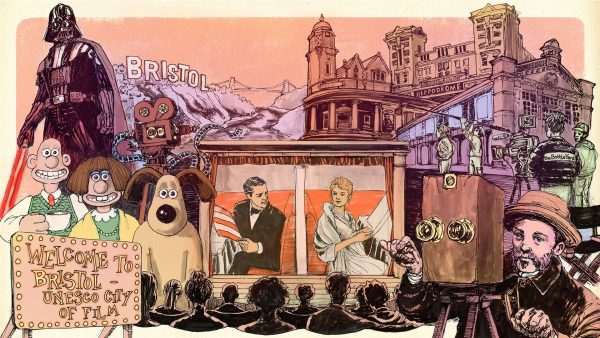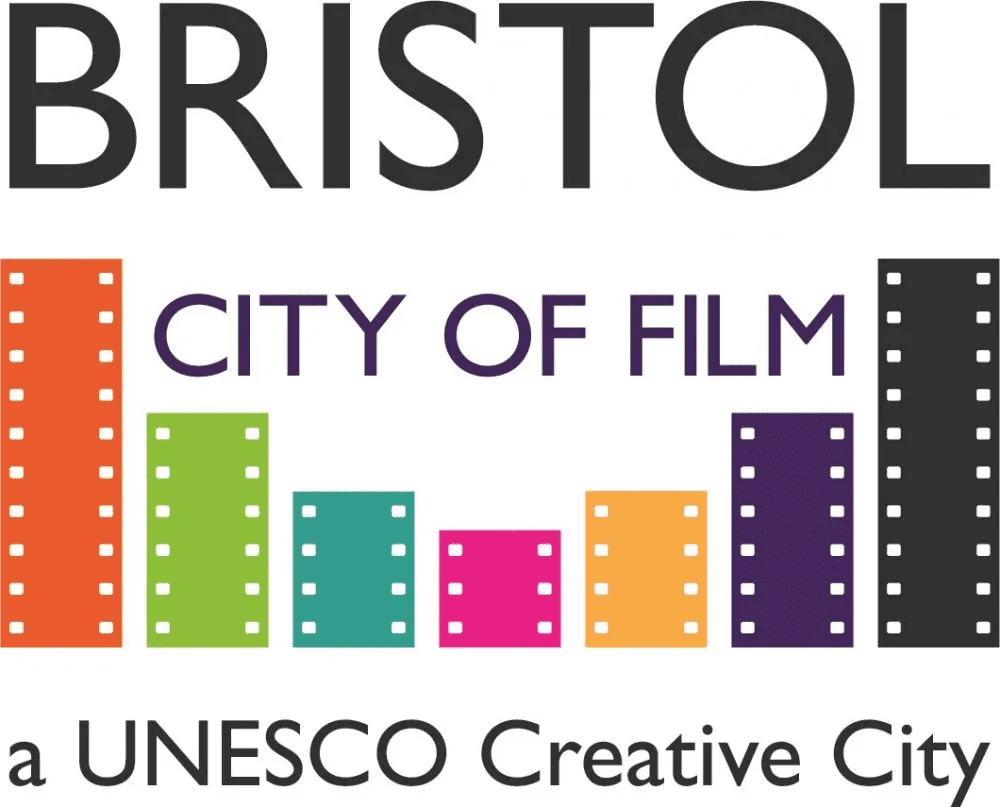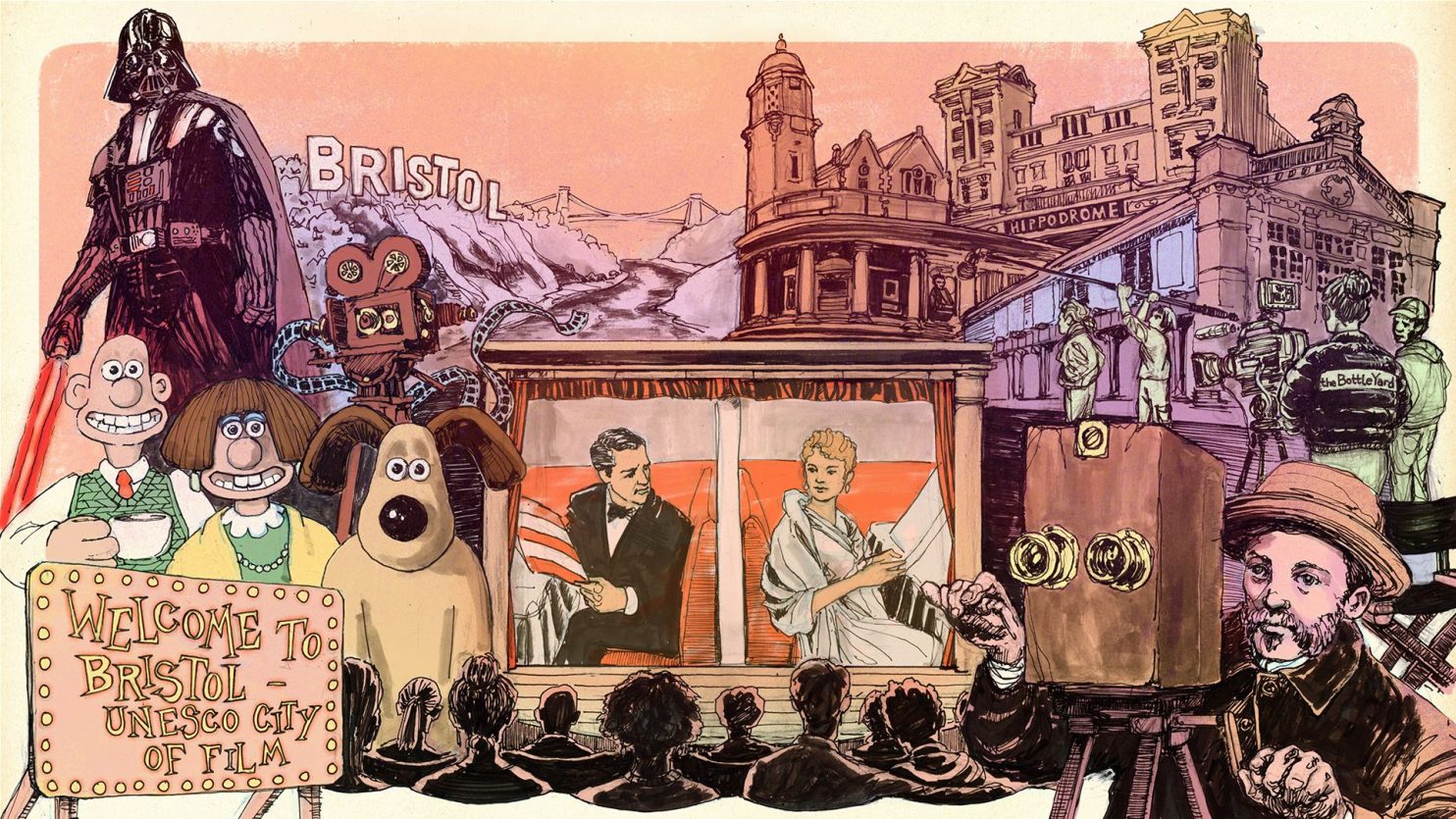
Illustration by Willem Hampson
2021 marked the centenary of the death of Bristolian inventor William Friese-Greene (1855-1921), pioneer of early motion pictures.
To mark the date and celebrate Bristol’s many modern-day film credentials, Bristol City of Film and Bristol Ideas presented Film 2021, a year long programme of activities supported by a city-wide partnership of Bristol’s film studios, cinemas, filmmakers and festivals.
Events included screenings across the city, walking tours exploring cinema buildings, photography exhibitions, talks and panel discussions, and the launch of a special publication recounting the public’s memories of cinema-going throughout the past 70 years.
A special Film2021 illustration (left) featuring some of Bristol’s was produced by Willem Hampson, freelance illustrator and UWE Bristol graduate. It features Friese-Greene with one of his experimental cameras alongside a number of Bristol’s other best known film landmarks and figures, including Bristol-born Cary Grant and Bristol-educated Deborah Kerr in ‘An Affair to Remember’; Bristol-born David Prowse as Darth Vader; Watershed; Bedminster Hippodrome; Whiteladies Picture House, Aardman’s Wallace & Gromit and The Bottle Yard Studios.
Speaking at the launch of Film 2021, Andrew Kelly, Director of Bristol Ideas, said: “For a long time, William Friese-Greene’s contribution to film had been dismissed. The centenary of his death is the perfect time to reassess his achievements as scholarship has revealed new material and Friese-Greene is now increasingly recognised as one of the pioneers of British cinema and a major figure in the early development of moving pictures. He was a fascinating individual who came from a working-class background into prominence in the world of science and he used that fame to promote the role of women in the field of photography, for example.”
“What better way to mark the achievements of Bristol’s film and moving image sector today than by shining the spotlight on a pioneer of the past who devised ground-breaking developments in motion picture technology,” added Bristol City of Film’s Natalie Moore. “The ripples of Friese-Green’s work were felt by the film industry in the UK and across the globe. With projects like the CAMERA Innovation Motion Capture Studio at The Bottle Yard now opening up possibilities of mo-cap technology to businesses, Bristol continues to break new ground today.”
Film 2021 was backed by Bristol Film Office, The Bottle Yard Studios, Cary Comes Home, Bristol Photo Festival, Watershed, Destination Bristol, Bristol Libraries, Encounters, South West Silents and many others.
About William Friese-Green (1855-1921)

William Friese-Greene: Analysis of Motion Experiment c. 1886. Science Museum Group © The Board of Trustees of the Science Museum, London
William Edward Green was born in 1855 in a house that used to stand behind the current City Hall, in College Street. He won a four-year scholarship to Queen Elizabeth’s Hospital School on Brandon Hill, leaving on his 14th birthday and going on to an apprenticeship with Marcus Guttenberg, a successful photographer at what is now 67 Queens Road. A plaque there credits Friese-Greene as ‘the inventor of the moving picture camera’.
In 1874 he married a German woman, Helena Friese, adding her name to his. In the ten subsequent years Friese-Greene went on to establish two studios in Bristol, one in Plymouth and another in Bath.
Friese-Greene and fellow inventor John Rudge collaborated to create magic lanterns that gave an illusion of movement by showing a series of photographic images in quick succession.
There is a plaque marking the location of Rudge’s home and a larger joint plaque for Rudge and Friese-Greene on the corner of New Bond Street Place, Bath. Friese-Greene is credited here as ‘the inventor of commercial kinematography being the first man to apply celluloid ribbon for this purpose’.
Around mid-1891, Friese-Greene filmed the street life outside the King’s Road studio. It is one of the earliest films shot of a London street currently known, pre-dating the films of Lumière, Edison, Birt Acres and Robert Paul by several years. There are eye-witness accounts from neighbours and colleagues of him projecting films in that basement workshop, including one of the street. From the late 1890s Friese-Greene was working on a variety of systems to create motion pictures in colour.
On 5 May 1921, Friese-Greene attended a meeting of film distributors to discuss the future of the British film industry. After giving a speech urging unity to an audience who had little idea who he was, he sat down and died of heart failure. At the time of his death the 1 shilling and 10 pence in his pocket was thought to be the only money he possessed. He was given a grand funeral, funded by the British film industry, and cinema projectors across the country were switched off for two minutes in tribute.
A highly imaginative film of his life and work, The Magic Box, was released in 1951 for the Festival of Britain. Martin Scorsese said: “the film that I think created the biggest impression on me about film and about filmmaking – the one that prompted me to say ‘maybe you could do this yourself’ – was The Magic Box.”
For more about Film 2021, visit the Facebook page www.facebook.com/bristolfilm2021.

